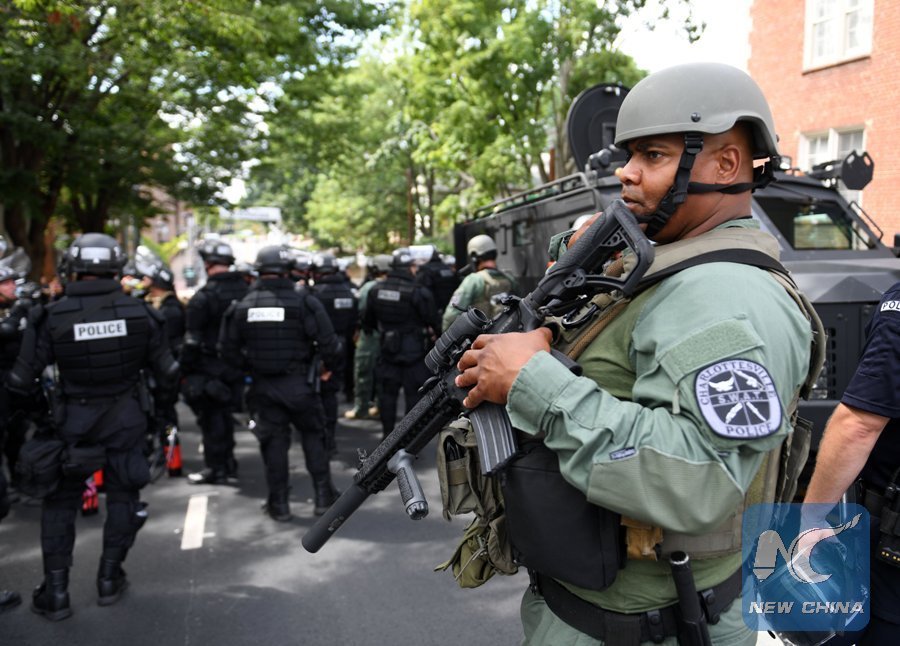
Police stand guard near the rally site in Charlottesville, Virginia, the United States, Aug. 12, 2017. (Xinhua/Yin Bogu)
by Matthew Rusling
WASHINGTON, Aug. 17 (Xinhua) -- Politically fueled violence could increase in the United States amid a rise of radical groups, experts said.
Last weekend saw violent clashes between a number of white power protesters and counter protesters in Charlottesville in the U.S. state of Virginia. Fights broke out as white supremacist protesters clashed with counter protesters, leaving both sides bloody, bruised and battered.
Reports indicated that the police were overwhelmed and backed off, leaving the two groups in a chaotic free-for-all. Suddenly, a car plowed into the counter protesters, sending bodies flying and killing a 32-year-old woman.
Darrell West, a senior fellow at Brookings Institution, a U.S. public policy think tank based in Washington, D.C., said the years ahead could see an increase in the number of radical fringe groups such as white supremacists, and could be "more volatile and tumultuous."
White power groups tend to comprise white, working class men, although experts say that white supremacists are a small minority of that demography and do not represent the whole.
Indeed, the white working class has been increasingly disenfranchised over the last two decades. Backing U.S. President Donald Trump during the 2016 presidential campaign, it was the major force that enabled the billionaire businessman to clinch the White House.
Trump promised he would improve their lives, fix the broken immigration system, and bring back manufacturing and jobs. However, with Trump's lack of legislative success so far, the group could grow increasingly frustrated in the coming years if Trump fails to keep his words.
That, West said, could increase the number of people engaging in racism and political violence.
The liberal Southern Poverty Law Center (SPLC), a U.S. nonprofit legal advocacy organization keeping tabs on mostly right-wing radical groups, said in a report earlier this year that the number of U.S.-based hate groups operating in 2016 rose to 917 -- up from 892 in 2015, although the list contained all hate groups, including anti-white groups comprising African Americans.
The number is 101 shy of the all-time record set in 2011, but still above historic average, the group said.
RISE OF THE RADICAL LEFT
Many on the radical right espouse racist ideals. The radical right includes groups such as the KKK, a racist organization that has murdered many African Americans in its more than 100 years of history.
Other groups are neo-Nazis -- supporters for the racist views of former Nazi leader Adolf Hitler -- and neo-Nazi skinheads, a rough and very tough group of racist street fighters that grew out of the 1970s punk music scene.
At the same time, there seems to be a growing radical left. The group Antifa, short for anti-fascist, is perhaps one of the best known. Among them are leftists and far leftists, but most members do not adhere to the official Democratic Party platform.
Antifa grabbed major headlines by throwing Molotov cocktails, destroying property and wearing black masks in Berkeley in the U.S. state of California earlier this year, when they protested Trump's supporter Milo Yiannopoulos, a conservative political commentator, who was to hold a speaking event at the University of California.
Some threw rocks and fireworks at police, according to U.S. media reports.
Often such groups assemble to shut down speakers they consider "racist," although many moderates and conservatives believe the radicals wrongly apply the term to any speech they don't like, whether it is actually racist or not.
Radical left groups have staged violent protests and destroyed property in rallies against conservative speakers at universities, calling them "racists" simply because, critics say, the radicals do not approve of the speakers' message.

